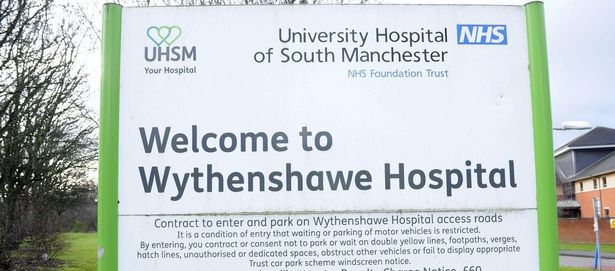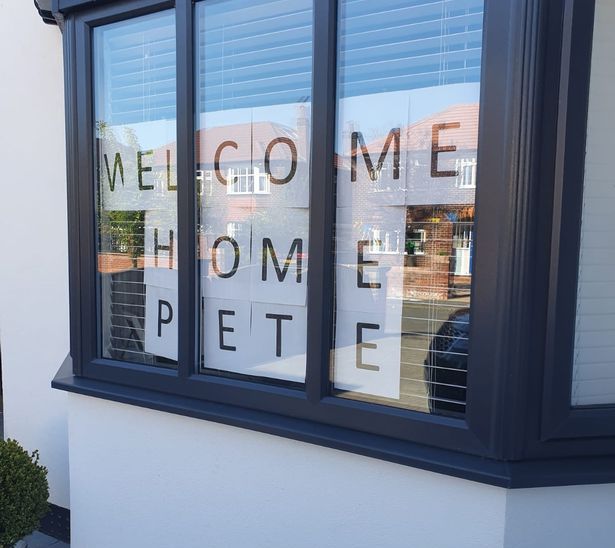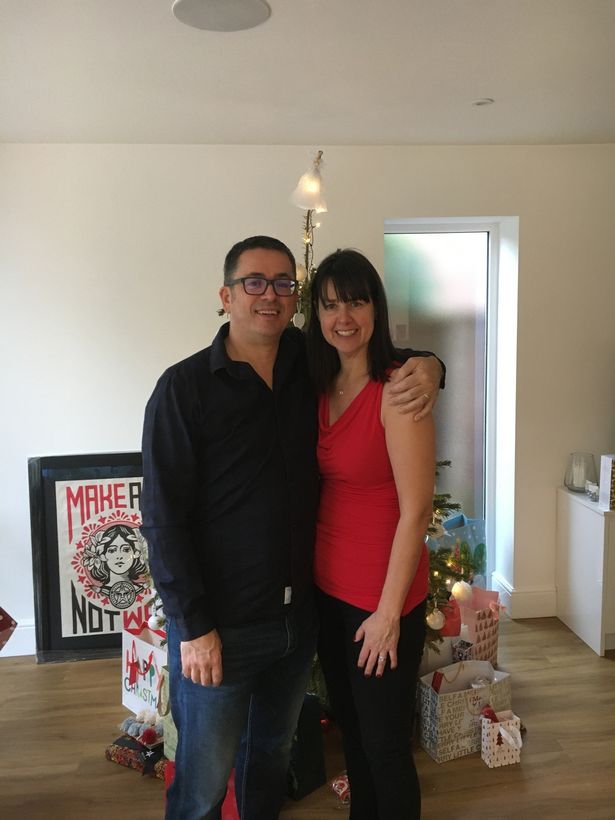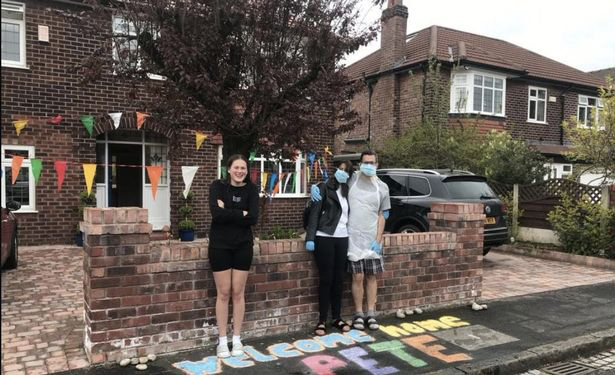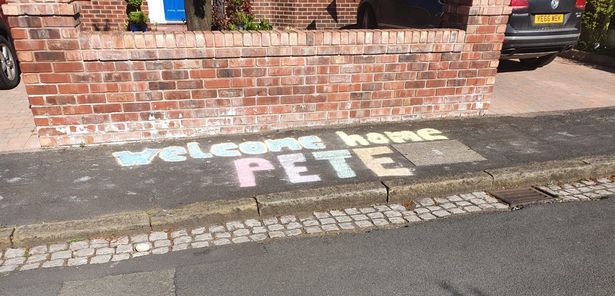Learning to breathe again: Between life and death on the coronavirus ward
A heart-warming story from the Manchester Evening News 20th April of a Covid-19 patient who was suffering from hallucinations and had to be ‘safely’ restrained by our team at Wythenshawe Hospital. We are so pleased that Peter is now fully recovered and at home with his family.
Peter Julian spent seventeen days in hospital. Eight of them on a ventilator. He experienced patients dying six feet away, hallucinations and post-traumatic stress. Here, in a horrific diary account, he details his battle to beat the virus.
Seventeen days in hospital.
Eight of them on a ventilator.
The helpless shock of your body learning how to breathe again.
“The best way I can describe it is imagine someone holding a cushion against your mouth and nose.
“Very occasionally it slips, giving you just enough breath to keep going.”
Paranoia, post-traumatic stress disorder and ‘horrifying, untrue’ hallucinations, some violent.
Patients dying six feet away.
A Covid-19 survivor who fought and won has shared in graphic, personal detail exactly what it’s like to battle the virus by revealing a daily diary of his experience he wrote to aid his recovery after returning home.
Peter Julian is 54.
He said he wanted to share his story with the Manchester Evening News not to shock or scare.
“I want people to understand what this is,” he said.
Wythenshawe Hospital (Image: MEN)
Peter doesn’t smoke, had no pre-existing health conditions and said he’s only had three days off work sick in the last decade.
He admits to a little ‘middle-age spread’, but exercises every day at home and cycles 30 miles a week.
But Covid-19, he said, respects no one and no circumstance.
The day the UK went into lockdown, father-of-three Peter, a business consultant, woke up at home in Sale, Trafford, with a few aches and pains.
Seven days later, he couldn’t breathe to even speak and was rushed to an intensive care unit at Wythenshawe Hospital.
What followed over more than a fortnight is detailed in his entries.
Peter told of ‘rows of people two feet apart all going through the same terror’.
Post-traumatic stress disorder, he said, was common for any patient leaving intensive care.
But Peter arrived back home to his family on Saturday.
In a moving gesture, neighbours left their houses to cheer and applaud as the car pulled onto the driveway. Messages chalked on pavements and signs in windows proclaimed ‘welcome home Pete’.
“Having narrowly survived Covid- 19, I wanted just to write up my own personal experience,” he said.
Neighbours welcomed his return (Image: MEN)
“I would like you to share as much of this as you want to, to as many people as you want.
“My main message is that the Covid 24-hour rolling news, and even the government and NHS websites, are at best very generalised news and could mislead you.
“You may conclude you are at no risk or at high risk. Neither is likely to be true.
“I would be lying to you if I didn’t say there were a number of times when I just wanted to give it up and join my dad.
“That thought was inviting and almost comforting. However, I knew I had a legion on my side who I wasn’t going to let down.
“Our NHS are truly the heroes.
“They kept me and thousands of others alive, whilst putting up with enormous trauma in exchange for somewhere between £9.23- £10.20 an hour in day, and £13 at nights.
“Their culture is just to stoically get on with things. Whilst brilliant and inspiring, this can work against them.
“This is going to be around for a year at least.
“Just in the time I was in hospital, the medics were rapidly learning the correct drugs cocktail to increase likelihood of life.
“The longer they get, the more of us will survive.”
Monday, March 23 : Had some aches and pains. Given the news, I went onto the NHS Covid-19 checker. Based on the list, I had no symptoms and therefore guessed at worst it was some other seasonal flu.
Tuesday, March 24 : I planted out some potatoes and carrots in a plot. Felt absolutely fine.
Wednesday, March 25 : Woke up with aches. Given I still had no symptoms, I assumed it was either seasonal flu, me maybe over-doing the digging, or a combination of the two.
Friday, March 27 : It was a lovely sunny day. I never sleep in the day, but fell asleep in the garden. So, if nothing else, I later went on to have best tan in the intensive care unit.
Weekend of March 28/29 : Started feeling breathless.
Re-checked my symptoms. With exception of breathlessness, I had no others. Stayed in bed again assuming flu.
Peter and his wife Carol (Image: MEN)
Monday, March 30 : Increasingly concerned, so I called paramedics. They came and took my vitals. No swab kits – so they said I may have Covid-19 based on some symptoms.
My profile, coupled with the observations, made them conclude I was in the two weeks/in bed/bit of paracetamol category.
They said I had none of the symptoms, re-confirming what I thought I knew and, in any case, I did not meet meet the criteria in terms of risk, age, etc.
Again, re-confirming what I thought I knew.
Wednesday, April 1 : Breathlessness increased.
Decided that if it continued into the following morning, I was calling 999 regardless.
Thursday, April 2 : My wife, Carol, called an ambulance as I could not speak due to breathlessness. Had some paracetamol prior to them arriving. My temp was 39.1C versus top range of 37.5.
My blood oxygen was really low. Rushed into intensive care. I was put on a ventilator as my body could not survive unaided. They brought me off at 9am on the 7th, five days later, thinking they had won.
By 9.45pm the same day, they had put me back on as my body was unable to exist without it. Even intensive care was shocked.
What’s interesting is that from a patient view, whilst medically this is the worst part, personally it was fine. I was out of it, so unaware of anything.
I could have been on it one day or 10 years, alive or dead. I wouldn’t have known.
Peter pictured with his wife and daughter Millie at home (Image: MEN)
Friday, April 10 : After nine days on the ventilator, I was brought off. This is the first instalment of difficult times.
So, whilst medically the good news is your body can now breathe, with help of massive oxygen levels, the experience is terrifying.
The best way I can describe it is imagine someone holding a cushion against your mouth and nose. Very occasionally, it slips giving you just enough breath to keep going.
Also a combination of the drugs and Covid-19 bacteria means everyone is hallucinating.
Finally remember we are all on lockdown, so no visitors Just rows of people two feet apart all going through the same terror.
Every day someone dies in front of you or has CPR. Ribs and sternums breaking all around you.
Saturday, April 11 : Yippee! Moved off intensive care onto a Covid-19 specific general ward. The breathing and hallucinations continued for everyone – however this is really the start of what I can remember.
A note of caution. In your own mind, the hallucinations are absolutely real, so from here on in, whatever I say may or may not be true. Where I have fact-checked, I will mark it as true.
Otherwise, it could be either.
The pavement outside his home (Image: MEN)
Another key point is everyone is suffering from a form of PTSD associated with Covid. It is a well-established fact that anyone who has been in intensive care for any reason reacts to the outcome.
Paranoia and active hallucination are part of this. How it is expressed will vary by individual. Some people just make bad decisions, some have pleasant, benign hallucinations and others have terrifying active ones, where people are coming to torture and kill you.
The cause of the hallucinations is the trauma. But it can also be the ongoing fight with bacteria, medication not yet being quite balanced for you, or something as simple as a water infection or constipation.
The benign ones I had are as follows.
I went on a cruise around the South China sea, spent a night at Lagos airport, spent a night at an aquarium. Had X-mas lights on the bed and a firework display every night.
I also told all the staff Millie [Peter’s daughter] and Carol were in Finland. Obviously, I couldn’t tell them about Millie dating Romeo Beckham, as I had signed the confidentiality clause.
I would have bet you five years’ wages this was all true.
But wherever I went in the world, weirdly the staff seemed the same and spoke with Manc accents. Who knew?
The horrifying untrue ones that I had were that people were coming to kill me. There was also a wolf in the ward, a giant and men with machetes all coming to do me immediate harm.
All I knew was that I was going to attack first and not be on the back foot.
My only problem was I was still on oxygen, could not walk at all, could not talk, was on a drip for fluids and food an on a catheter, making my fighting skills lower than their previous ‘wet paper bag’ prime.
Wednesday, April 15 : Literally first steps and first day I can talk. Maybe managed four steps?
The horrific hallucinations get worse.
I know what I need to do. Yep, pro-actively kill any man, other than my fellow patients, that I come across before they kill me. Ladies. You will be pleased to know you were all off the death list.
Thursday, April 16. 8.45am : Go to physically attack as many men as possible, armed with plastic cutlery despite not able to walk. Security are called. I explain to the three, strong, experienced guys aged in their 30s that I am going to kill all of them.
Safe to say I was safely restrained in about 30 seconds.
My pal wakes up. He said that whilst my implementation was poor, no one could take away my ambition!
In reality, I felt dreadful.
The ‘all hands to the pump’ approach in the NHS meant some nurses knew what they were seeing was PTSD and some just thought they had a raging madman on their hands.
Carol rang about 9am-ish to ask what type of night I have had. Suffice to say, the answer wasn’t really the one she wanted.
I felt terrible. I know what these staff are going through and felt awful that I had added to their workload and worries. The guilt was crushing.
My son Tom is a junior doctor working in Covid-19 in Sheffield. He had just finished a 12-hour night shift.
He rang in to check my night.
Again, was not the answer he wanted, but he did a great job in talking me down and suggesting that maybe rather than killing all medics, I might find they were there to help me.
Friday, April 17 : Play around with meds, fluids etc and move ward.
First night of non-horrific hallucinations. Also, on solid food.
Saturday, April 18 : Released home – hoorah!
I reckon about four to nine months to deal with the physical effects- loads of body muscle gone and about 1st 8lb in weight. Then there is losing the trauma.
I reckon I saw someone die or have CPR daily and within six feet of me. That’s going to take time to process.
They reckon for everyday in an ICU, it will be around a week of recovery afterwards.
Peter spoke out to praise the ‘sheer compassion and professionalism’ of all the NHS staff, included those who have already served their time but have bravely gone back to the frontline during the pandemic.
He said having a belief system helped get him through.
“I also thought I had lots to live for – my family,” he said.
“Lots of people sit there, getting institutionalised and waiting for decisions to be given to them. I maintained my own responsibility for my own outcomes and challenged where needed.
“This was important as you need to remember the only people used to dealing with Covid symptoms are intensive care staff.
“Most other doctors and experienced staff hadn’t properly understood the trauma.
“Where you got Covid from is irrelevant. You might have it and have no symptoms at all.
“You might have exactly the same dose and be poorly at home for a week or two, or you might, like me find out you have some DNA respiratory wiring which means at best you will be in intensive care and probably won’t make it.
“In my small group, we reckon five out of every six people going into hospital died.
“From what I saw there was no correlation between age and sex and death rate.
“The bloke opposite me was 41 with a four-year-old daughter.
“Do what you can. If you smoke – quit.
“If you are fat, lose weight. Socially distance.
“Get a bit fitter. Get a positive mental attitude. This is not just flu, nor will it kill everyone.
“If you know someone in ICU – try not to worry. Do not underestimate how little acts of support by you can make a massive difference to them.”
You can read the original story on the Manchester Evening News website here.


